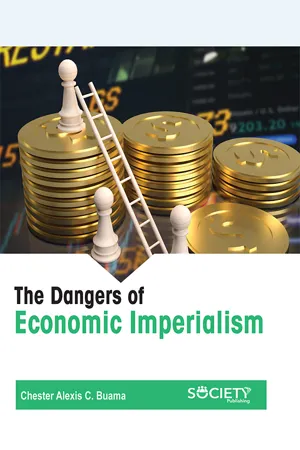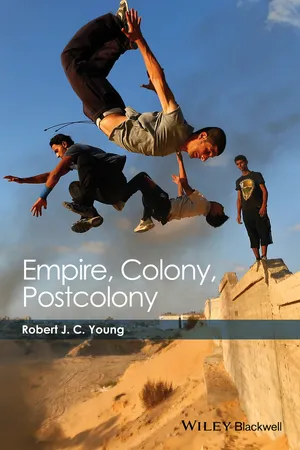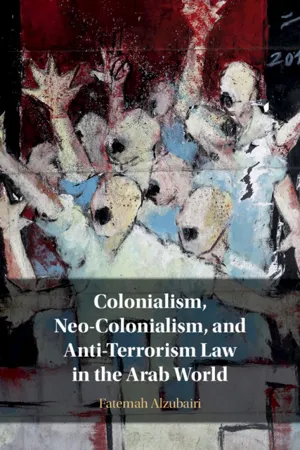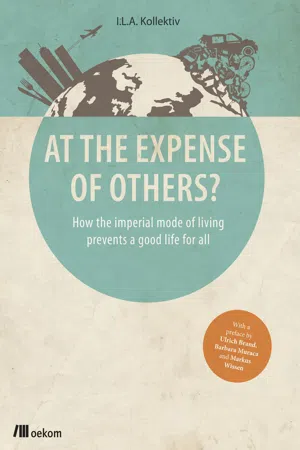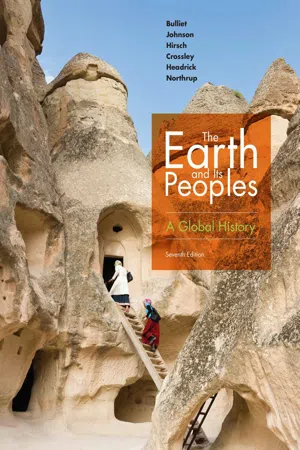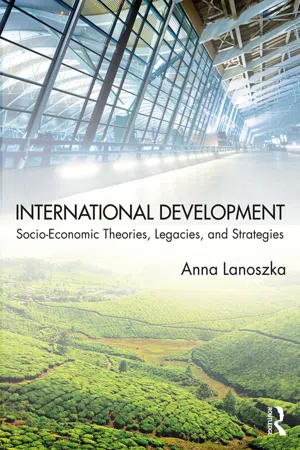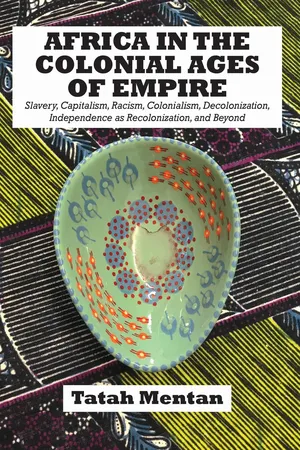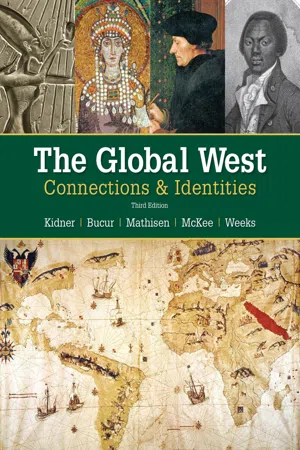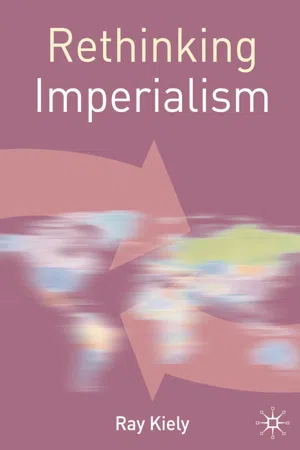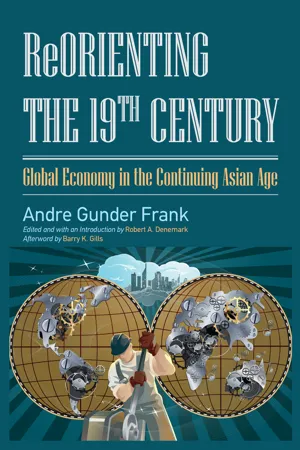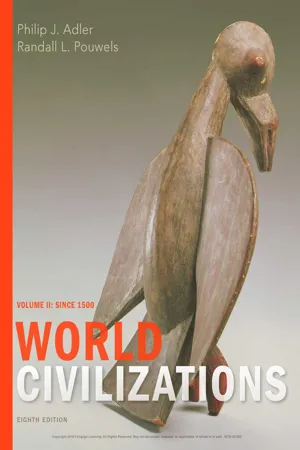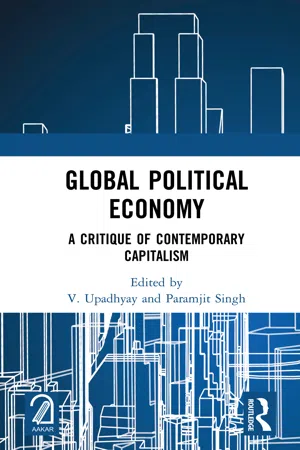History
Old Imperialism
Old Imperialism refers to the period from the 15th to the 19th centuries when European powers established colonies primarily for trade and resources. It was characterized by the establishment of trading posts and the exploitation of indigenous peoples and resources. Old Imperialism laid the groundwork for the expansion and dominance of European powers in the global arena.
Written by Perlego with AI-assistance
Related key terms
1 of 5
12 Key excerpts on "Old Imperialism"
- eBook - PDF
- Chester Alexis C. Buama(Author)
- 2023(Publication Date)
- Society Publishing(Publisher)
The significant developments in economic theory noted in the literature include the 1870s marginalist revolution, the 1950s formalist revolution, and the 1970s new classical economics. The Dangers of Economic Imperialism 62 3.3. THE AGE OF IMPERIALISM Even though the Industrial Revolution and nationalism altered nineteenth- century European culture, imperialism, and the dominance of one country or people over another set of people dramatically reshaped the world in the latter part of that century. The eighteenth century did not mark the beginning of imperialism. European powers pursued trading routes with the Far East, explored the New World, and built settlements in North and South America and Southeast Asia from the sixteenth to the early nineteenth century, an era characterized by what is now known as Old Imperialism. They established commercial facilities and built footholds on the African and Chinese coasts, working closely with local rulers to assure the preservation of European economic interests. Their power, however, was limited. In the 1870s, the Age of New Imperialism started, with European governments establishing enormous empires mainly in Africa, as well as in Asia and the Middle East. Unlike in the sixteenth and seventeenth centuries, the newer imperialists established governance of local territories in the interest of the colonial authority. European nations adopted an ambitious expansion agenda driven by the economic necessities caused by the Industrial Revolution. Europe had a “Second Industrial Revolution” between 1870 and 1914, accelerating the speed of change as science, technology, and industry fueled the economic expansion. Steel manufacturing advancements transformed shipbuilding and transportation (Figure 3.2). Figure 3.2. Launch of the SS Great Britain, the revolutionary ship of Isambard Kingdom Brunel, in 1843. Source: Image by Wikimedia Commons. - eBook - ePub
- Robert J. C. Young(Author)
- 2015(Publication Date)
- Wiley-Blackwell(Publisher)
5 Colonialism and ImperialismWe have seen that from the earliest days colonies, settlements, or trading posts abroad were established for a number of reasons: freedom of religion, need for land for surplus population, or desire to accumulate wealth through trade or the establishment of plantations. They tended to be created, as a result, on a relatively haphazard, pragmatic basis, driven by the needs of individuals, small groups, or licensed trading companies. Though they became components of particular empires, colonies were not generally planned from the outset as part of an imperial project, and there was often a degree of power struggle between a local desire for autonomy and control by the Crown to which they retained their nominal allegiance, as in the case of Britain’s or Spain’s American colonies.Later colonies, especially in the nineteenth century, tended to be established as part of an imperial design. Empire involves universal rule by a sovereign power from the imperial center. Unless the empire is organized through indirect rule as separate fiefdoms, in some degree this requires a bureaucracy of sorts, loyal to the emperor, that will drive its priorities and require its laws to be obeyed throughout the empire. The rationale of empire is regional or global power, internal and external, and, as part of this, the accumulation of wealth. Nineteenth- or twentieth-century European empires did not essentially differ from this model. The word that came to be given to the imperial project as an idea driven from the metropolitan center at the highest level of the state itself was “imperialism.” Imperialism was an overarching concept or ideology that openly advocated and practiced domination over the territories of other peoples of a different race. While colonization was the practice of actual settlement or occupation, the term “colonialism” is used to describe the colonial system that was put into operation in the colony itself, whereby non-Europeans, considered “backward” on racial grounds, were ruled and exploited by European (or Russian or Japanese) rulers or settlers. Colonies were the separate parts of empire, empire was the totality, the complete picture, seen as the product and possession of the imperial state and from its centered perspective. By the late nineteenth century, imperialism also came to be used to describe the development or maintenance of power (“hegemony”) of one country over another through economic, diplomatic, and cultural domination even in the absence of direct colonial occupation. - Fatemah Alzubairi(Author)
- 2019(Publication Date)
- Cambridge University Press(Publisher)
On Imperialism, Colonialism, and Neo-Colonialism 21 which can be economic, strategic, or even cultural in nature, with minimal or no military involvement and without claiming sovereignty. It suggests the exercise of the essence of an imperial policy without the direct engagement of the empire’s formal representatives. The elites in the colonized territories often play a significant role in these imbalanced power relations, as they link the imperial power with its indigenous policymakers. 11 This form of control can exist prior to, after, or between periods of colonialism. For example, Juan Cole argues that during the eighteenth and nineteenth centuries, particularly in the Middle East, “colonies often existed before colonialism.” 12 This means that imperialism dominated many parts of the world politically and economically whether or not direct colonization took place. 13 Informal empire still exists in our current time where it is described as “neo- colonialism” (discussed below). This book is concerned with imperialism only within a specific timeline: the “new imperialism” 14 that prevailed from the eighteenth century onward, and its major Western players, above all Britain and France, and later the United States. Imperialism paved the way for direct colonialism. Britain and France engaged in direct colonial control all over the world including in the Arab region. The United States, although it did not have colonies in the Arab world, colonized the Philip- pines, Puerto Rico, Hawaii, Guam, Samoa, and the Virgin Islands. 15 Nonetheless, the United States remains a later colonial player than Britain and France, which were the most influential colonial leaders of their time. Colonialism refers to the direct military and political occupation and expansion overseas by the European powers, which spread widely during the nineteenth and twentieth centuries and which sought to protect the colonists’ political and eco- nomic interests.- eBook - PDF
At the Expense of Others?
How the imperial mode of living prevents a good life for all
- (Author)
- 2019(Publication Date)
- oekom verlag(Publisher)
and rational ways of dealing with the world. For sub-jugated and exploited peoples, the strength and wealth of their foreign masters were often seen as proof of the ‘objective correctness’ of their worldview and methods. Thus success could only be brought about using the same approach. This devalued non-European cultures and their knowledge — to the benefit of Western con-cepts (see Education and knowledge). Industrialisation and imperialism Europe’s global dominance only developed in the wake of a second wave of colonial expansion in the 18th and 19th centuries, and in the 20th century, this then led to the division of the world into ‘developed’ and ‘under-developed’ nations. 13 For centuries, it was non-Euro-pean countries such as China, India and a few others (today referred to as ‘developing nations’) that held the largest share of global income (Figure 2.1). 14 This, how-ever, changed quickly. Competing European colonial powers expanded their grip on global resources — land (see Food and agriculture), labour (forced ser-vitude or slavery) and raw materials — and violently divided up the world between them. This era, when Europe subjugated and suppressed most of the world, has become known as the Age of Imperialism. Impe-rialism fundamentally altered international relations and its effects continue to be felt in many aspects of life today. Whereas the countries of the Global South still controlled around 63 per cent of global income at the beginning of the 19th century, this share had dropped to a mere 27 per cent by the middle of the 20th century. 15 Industrialisation and its colonial dimension Agriculture had long been the dominant sector, yet over the course of the 18th and 19th centuries, indus-try, business, trade and transport gradually took over. These sectors now drove economic growth and the de-velopment of society. - eBook - PDF
The Earth and Its Peoples
A Global History
- Richard Bulliet, Pamela Crossley, Daniel Headrick, Steven Hirsch(Authors)
- 2018(Publication Date)
- Cengage Learning EMEA(Publisher)
666 C H A P T E R 2 6 Varieties of Imperialism in Africa, India, Southeast Asia, and Latin America, 1750–1914 C H A P T E R 2 7 The New Power Balance, 1850–1900 C H A P T E R 2 8 The Crisis of the Imperial Order, 1900–1929 C H A P T E R 2 9 The Collapse of the Old Order, 1929–1949 C H A P T E R 3 0 Revolutions in Living, 1900–1950 PART VII D uring the century that preceded 1830, European imperialism gained new footholds, sometimes against intense resistance, in parts of Africa and Asia. Most expan-sion continued earlier patterns in which European trading compa-nies rather than governments took the initiative. From roughly 1830 onward, formal colonies governed by state-appointed administrators and supported by European armies came to the fore in a scramble for territory in Africa and the Pacific region. By World War I, Europe, the United States, and Japan col-lectively dominated much of the world and tried to convert other peoples to their own cultures and ways of life. In Europe, mounting tensions led to the Great War of 1914–1918. Russia and China erupted in revolution. Soon after, the heartland of the Ottoman Empire became modern Turkey, while its Arab provinces were taken over by France and Britain. Global Diversity and Dominance, 1750–1945 Copyright 2019 Cengage Learning. All Rights Reserved. May not be copied, scanned, or duplicated, in whole or in part. Due to electronic rights, some third party content may be suppressed from the eBook and/or eChapter(s). Editorial review has deemed that any suppressed content does not materially affect the overall learning experience. Cengage Learning reserves the right to remove additional content at any time if subsequent rights restrictions require it. 667 Amidst a worldwide trans-formation of lifestyles brought on by new technologies, the political and economic system the Euro-pean powers crafted after the war fell apart in the 1930s. - Available until 25 Jan |Learn more
International Development
Socio-Economic Theories, Legacies, and Strategies
- Anna Lanoszka(Author)
- 2018(Publication Date)
- Routledge(Publisher)
By the beginning of the sixteenth century, imperial competition between Spain and Portugal was fast accelerating. In 1521, Cortez conquered the Aztec empire, paving the way for the eventual Spanish conquest of a territory known today as Mexico. 7 For the next 400 years Europe would strive to control most of the globe. According to a major study, in 1800 European powers controlled one-third of “the world’s land surface,” two-thirds by 1878, and four-fifths (or just over 84 percent) by 1914. 8 The period of European domination lasted over several centuries. This is why it is helpful to clarify the terms used, such as imperialism, colonialism, and neocolonialism: “whereas colonialism means direct rule of people by a foreign state, imperialism refers to a general system of domination by a state (or states) of other states, regions or the whole world.” 9 Neocolonialism is more elusive as a term. Following an observation of one scholar, it is a peculiar kind of relationship that translates to “inequitable ties” of former colonies with a world economic order. These ties, which long outlived independence, are the result of the colonial experience. 10 To put it more expressively: To African nationalists neocolonialism does not mean the imposition of new forms of alien control from outside Africa; rather, it is the persistence of residual European influence in Africa itself. Moreover, it is not direct political control or influence that is the irritant, but the omnipresent cultural influence of the West, which saturates all aspects of life. 11 The above definitions serve to distinguish among the three stages of European expansionism. The first phase, characterized by imperialism, stretched from 1415 to 1776. The second phase involved the formal establishment of colonies. It lasted symbolically until 1945, when the end of World War II marked the beginning of the formal decolonization period - eBook - PDF
Africa in the Colonial Ages of Empire
Slavery, Capitalism, Racism, Colonialism, Decolonization, Independence as Recolonizati
- Tatah Mentan(Author)
- 2017(Publication Date)
- Langaa RPCIG(Publisher)
New York: St. Martin’s Press. Rodney, Walter. (1972). How Europe Underdeveloped Africa. London: Bogle-L’Ouverture. Rotberg, Robert I. (1988). The Founder: Cecil Rhodes and the Pursuit of Power. New York: Oxford University Press. Said, Edward W. (1993). Culture and Imperialism. New York: Knopf. Stora, Benjamin. (2001). Algeria 1830-2000: A Short History. Trans, by Jane Marie Todd. Ithaca, NY: Cornell University Press. Thomas, Lynn. (2003). Politics of the Womb: Women, Reproduction, and the State in Kenya. Berkeley: University of California Press. 176 177 Chapter 5 Africa: Legacies of Old Colonial Age of Empire Overview The Old Colonial Age of Empire stretched from 1450-1950. It was an epoch of slavery, racism, colonialism, imperialism and resistance. These systems of slavery, patriarchy, capitalism, old colonization, and imperialism were based on a system of European power and dominance. These types of systems governed the way African societies lived and were treated on the ground. The enslaved, colonized and exploited resisted these evils. And, they were offered the abolition of slave trade and slavery, decolonized. But, something escaped societal memory. In other words, there are two major ways that Africans were duped into seeing ‘The changing of the masks’ as social progress: a) By not understanding that every successful nonviolent movement had a violent counterpart that was crucial to the success of the overall struggle; and, b) By not understanding the way that oppression simply changes forms, methods, and definitions while maintaining or increasing the actual level of oppressive violence. Without doubt, colonial governments brought roads, railroads, ports, new technology, and other benefits to Africa. However, their policies also damaged traditional economies and dramatically changed patterns of land ownership and labor. - eBook - PDF
- Frank Kidner, Maria Bucur, Ralph Mathisen, Sally McKee(Authors)
- 2018(Publication Date)
- Cengage Learning EMEA(Publisher)
All Rights Reserved. May not be copied, scanned, or duplicated, in whole or in part. Due to electronic rights, some third party content may be suppressed from the eBook and/or eChapter(s). Editorial review has deemed that any suppressed content does not materially affect the overall learning experience. Cengage Learning reserves the right to remove additional content at any time if subsequent rights restrictions require it. 669 E uropean expansion and colonialism did not start in 1870. Spain and Portugal established American colo-nies in the late fifteenth century, and Russian domi-nation of Siberia in northern Asia dates from the seventeenth century. But the imperialism of the late nineteenth century was something new. Europe’s industrialization and new technolo-gies enabled it to quickly affect a huge part of the world, and more Europe countries than ever before got involved in the race for colonies. In little more than a generation, Europeans extended colonial rule over much of the globe. Colonies provided Europeans with raw materials and markets. These were good for European economies. Imperial rule also fascinated Europeans, whose very identity became linked with their countries’ role as overlords in Africa, Asia, and the Muslim world. Europeans were proud of their cul-ture and believed it superior to any other civilization in the world. The scientific and technological advances of the nine-teenth century, rising literacy rates, and the general advance in living standards convinced them that their rule over other lands benefited both Europeans and colonial peoples. In 1870, a few European colonies and settlements already existed on the edges of Africa. Thirty years later, the entire continent had been divided up among the European pow-ers. The largest colonial territories were held by Britain and France, but Portugal, Belgium, and Germany also ruled over thousands of square miles and hundreds of thousands of Africans. - eBook - PDF
- Ray Kiely(Author)
- 2010(Publication Date)
- Red Globe Press(Publisher)
Indeed, most European foreign investment from 1880 to 1914 hardly fits the clichés of either surplus capital export or modernizing colo-nialism; rather, investors, often through financial intermediaries, tended to focus on low risk securities backed by real property, located mainly in the developed countries, the dominions, and a few richer Latin America economies (O’Brien 2006). A related argument concerning the necessity of imperialism is the question of the relationship between raw material provision and industrialization in the core countries. A classic argument made by dependency and under-development theorists is that one form of surplus extraction from periphery to core was through the South providing cheap raw materials that were essential to the development of the core capitalist countries. Applied to the nineteenth and early twentieth centuries, this argument is unconvincing. The main source of energy in this period was coal, and in 1913, in the most industrial-ized European countries (Belgium, Germany, France, Switzerland, Sweden, Britain), their combined surplus of coal exceeded their consumption by 12 per cent. This was despite the fact that Sweden, Switzerland and France were net coal importers. Britain on the other hand accounted for 6 per cent of total global production, and 27 per cent of its national production was exported (Bairoch 1993: 59). The developed European countries were dependent on the import of oil, Classical Imperialism, 1882–1945 79 but in 1913 oil was a minor source of energy, its share of total energy supply in Europe accounting for less than 1 per cent of its consump-tion (Bairoch 1993: 61). Moreover, at this time the United States was the main oil producer. The switch to rapid dependence on oil, and reliance on exports from Third World exporters, only took place after the Second World War. In terms of minerals, iron ore was by far the most important metal produced before First World War. - eBook - ePub
Reorienting the 19th Century
Global Economy in the Continuing Asian Age
- Andre Gunder Frank, Robert A. Denemark(Authors)
- 2015(Publication Date)
- Routledge(Publisher)
Britain in particular saw population grow from 27 million in 1850 to 35 million in 1880, or by only 30 percent, and Germany by 25 percent. If we include European Russians and their migration to Siberia, the total rises to 212 million in 1850 and 270 million in 1880, or by 27 percent. Thus, while in 1850 North America had only 10 percent of this combined North Atlantic population, by 1880 that had risen to almost 30 percent, and correspondingly the European share had fallen from about 90 percent to 70 percent (numbers rounded from the Woytinskys [1953: 44]). European immigration to other settler countries like Canada, Australia, and New Zealand that are included in Maddison’s “European Offspring” category had similar if less spectacular results. Strictly speaking, Argentina and Uruguay, though located in South America, belong in this category as well. Bairoch (1997: II-557) offers a conveniently clarifying summary. In 1700, 3 million or 2 percent of people of European descent lived outside Europe. By 1913, they were 150 million and 31 percent. That had to make an enormous difference. In any case, as McKeown summarizes, “Concurrent growth around the world was not coincidental, but linked through an increasingly integrated global economy. It was a world on the move, flowing into factories, construction projects, mines, plantations, agricultural frontiers, and commercial networks across the globe” (2004: 171).Trade: Total, Regional, by Product and Terms of Trade
This was the period of classical imperialism, European colonialism in Asia and Africa, and the “imperialism of free trade.” But while this period was in the nineteenth century, it was not representative of the nineteenth century, contrary to the explicit and often only implicit suggestion that this was the nineteenth century. It is essential to understand and therefore worth repeating that we are dealing with a period of only the last three, and especially the last two, decades of the nineteenth century, and that they marked a, indeed the , major quantitative and qualitative political economic departure from previous history. It was essentially (only) during this period that the major East to West geopolitical economic worldwide shift occurred to which Pomeranz (2000a) refers as The Great Divergence . For it was the decade of the 1870s in which the “second” industrial revolution took off in Western Europe and then North America, and in which simultaneously the defensive and sometimes still even offensive nationalist postures and policies of East and West Asians, Africans, and Latin Americans were defeating or were being defeated by the Europeans.The principal instruments of their so doing were two, and they were related. One was the quantitative and qualitative transformation of the global division of labor and system of world trade and payments into the hierarchical multilateral one analyzed in this chapter. Britain and then Western Europe and the United States benefited most, and to a lesser extent the temperate regions of new but still sparse European settlement, at the greatest expense of the tropical regions that were the homes of the bulk of global population. The other instrument was the colonial and neocolonial state that intervened to make this new global division of labor and world trade work. Colonial states were both those that did the colonizing and the ones that they colonized directly and indirectly, but still effectively through the “imperialism of free trade.” These included the “comprador bourgeois” of China and the neocolonial Ottoman and Persian states in West Asia, and in Latin America. Among the major instruments for doing so were “unequal treaties” using military, political, and/or debt leverage to permit or require low or no tariff access to their markets and related fiscal and monetary policies, and purchase at favorable prices in the guise of “foreign investment” of their often already previously nationally installed economic infrastructure like railways and ports, and other measures of imperial preference to the enterprises and merchants of one or another European imperializing power. - eBook - PDF
World Civilizations
Volume II: Since 1500
- Philip Adler, Randall Pouwels(Authors)
- 2017(Publication Date)
- Cengage Learning EMEA(Publisher)
—rudyard kipling The last quarter of the nineteenth century witnessed an extraordinary surge in Western activity in the non-Western world. This reached a climax in the 1870s with a sudden enthusiasm by the major European powers and the United States for seeking new colonies abroad and consolidating old ones; it is often called the New Imperialism. The most dramatic manifestation of this New Imperialism was the so-called Scramble for Africa, which began around 1882 and lasted until World War I. During these years, about half a Background of the New Imperialism, 1790–1880 ● Rivalry for New Markets ● Strategic Issues ● Nationalism and the Clash of Rival Imperialisms ● The White Man’s Burden The Scramble for Africa, 1880–1914 Reactions to European Domination Changes in African Societies ● Undermining the Old Ways ● Economic Changes chapter outline “THE RHODES COLOSSUS.” This contemporary cartoon from Punch magazine depicts the strategic aims of British imperialists in Africa. Cecil Rhodes (1853–1902), famous as the diamond magnate who founded the de Beers monopoly in South Africa, struggled to advance British ambitions to create adjoining British territories in Africa stretching from Cape Town to Cairo. The Rhodes Colossus, from Punch, December 10, 1892 (engraving) (b/w photo), English School (19th century)/ Private Collection/The Bridgeman Art Library Copyright 2018 Cengage Learning. All Rights Reserved. May not be copied, scanned, or duplicated, in whole or in part. WCN 02-300 484 CHAPTER 36 | European Imperialism and Africa During the Age of Industry provided outlets of this sort for free capital. Where new markets could be found and opened up to free trade and investment, the opportunities for profits were greater than in the home countries (or so-called metropoles). Strategic Issues The British government came under intense pressure from industrialists and financiers to secure lucrative markets in India and East Asia from their European rivals. - eBook - ePub
Global Political Economy
A Critique of Contemporary Capitalism
- V. Upadhyay, Paramjit Singh, V. Upadhyay, Paramjit Singh(Authors)
- 2021(Publication Date)
- Routledge(Publisher)
15 What is Imperialism? Situating Imperialism in Relation to Capitalism and ColonialismV. UpadhyayIntroduction
What is imperialism, specifically in today’s context? This issue is discussed here in the framework of Marxist political economy. Imperialism is also an important subject in other areas such as cultural and literary studies. Those are, however, outside the scope of this chapter.A recent book by Utsa Patnaik and Prabhat Patnaik, A Theory of Imperialism (2017), published by Columbia University Press, claims to formulate a theory of imperialism that has relevance not only for the past, but also in the present era. The authors attempt to refute those Marxist and other writers who today, explicitly ‘reject the term “imperialism” insofar as it is taken to mean any systemic tendency for metropolitan capital to dominate the outlying regions in particular.’The Patnaiks identify ‘increasing supply price,’ ‘the value of money’ and ‘income deflation’ as the three central features of imperialism:Imperialism …….. is a coercive relationship exercised by the capitalist sector on the “outside” world to ensure, first, that it obtains the products that it needs from the “outside” world and second, that it does so at non-increasing prices………
Index pages curate the most relevant extracts from our library of academic textbooks. They’ve been created using an in-house natural language model (NLM), each adding context and meaning to key research topics.
